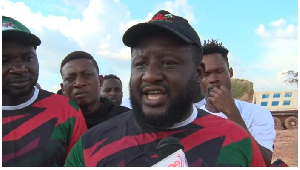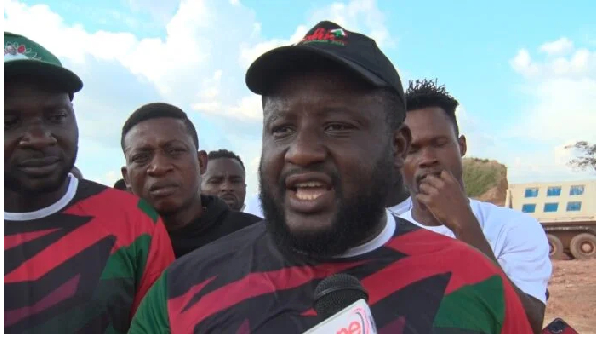 Samuel Hadjor, a member of the NDC’s Mining Committee among other supporters
Samuel Hadjor, a member of the NDC’s Mining Committee among other supporters
The Mining Committee of Ghana’s National Democratic Congress (NDC) has alleged that Chinese nationals are overtaking the government’s Community Mining Scheme, which was initially intended to benefit local Ghanaians.
During a campaign tour in the Western Region, Samuel Hadjor, a member of the NDC’s Mining Committee, expressed concerns over the increasing involvement of foreign nationals, particularly Chinese individuals, in local mining operations. The NDC team claimed that this foreign involvement, enabled by politicization within the scheme, is depriving local communities of the intended benefits.
The ruling New Patriotic Party (NPP) government launched the Community Mining Scheme as a way to formalize small-scale mining and combat illegal mining, also known as galamsey, which has been devastating the environment and polluting Ghana’s water bodies.
The scheme was designed to empower locals in mining districts across the country by giving them a legitimate path to participate in mining activities. However, some local miners and residents are raising concerns that foreign nationals are still heavily involved in the scheme, gaining access to mining sites and reaping benefits at the expense of local people.
In a recent NDC campaign tour to Wasa mining communities, Kwame Amoah, a local miner, expressed frustration with the way the scheme is being managed.
“I’m pleading with the government. We are all one family and Ghanaians,” Amoah shared. “It shouldn’t be that someone from China, who doesn’t know Manso Totokrom, is benefiting more easily while a Ghanaian is arrested for the same thing.”
Kwame Amoah’s plea underscores a common sentiment among local miners who believe that foreign influence in the scheme has created an unequal playing field, making it difficult for Ghanaians to benefit as originally intended.
In response to these concerns, the NDC’s 2024 manifesto proposes replacing the Community Mining Scheme with a new structure called Artisanal Small-Scale Cooperatives. According to Samuel Hadjor, this new framework will prioritize local communities, ensuring that they gain the full benefits of mining resources in their regions.
Michael Kwadwo Peprah, another member of the NDC’s mining team, explained that this cooperative approach will decentralize the licensing process and bring it closer to mining districts, making it easier for local miners to acquire the necessary permits.
As part of the cooperative model, the NDC intends to offer extensive training for miners to ensure they possess the required skills to engage in sustainable mining practices. Kwadwo Peprah noted that the new structure would also include a reclamation strategy, which mandates environmental restoration after mining activities have concluded.
“Reclamation is a crucial part of responsible mining,” he emphasized. “We want to make sure that mining sites are returned to their original state through replanting and restoration efforts.”
The NDC also plans to introduce a fund known as the “Replenishment Bond,” which would be a reserve of money set aside by small-scale miners for reclamation purposes. Should a miner successfully restore a mined area, the bond will be returned; if not, the government would use the funds to carry out the necessary restoration work. This system aims to ensure that mined lands are consistently rehabilitated, benefiting both the environment and the local communities.
Additionally, the NDC manifesto outlines a plan to establish a ‘Gold Board’ in each district, similar to Ghana’s Cocoa Board. This board would oversee the small-scale mining sector, providing financial, technical, and logistical support to miners and offering a regulated market for the sale of gold. The board would also work to secure fair and competitive prices for the gold produced by small-scale miners, benefiting both the miners and the national economy.
Kofi Ntim, a local miner, voiced his support for the NDC’s proposal, noting that effective leadership is crucial to Ghana’s progress.
“If Ghana is to improve, it depends on a leader who truly prioritizes the well-being of its citizens rather than making them suffer. This is why we will vote for John Dramani Mahama to be president.”
Nimarko Sampson, another resident, mentioned a recent meeting with NPP representatives, where promises were made about mining regulations that ultimately led to confusion.
“During a meeting, we were told by some NPP members that Dr. Bawumia said everyone should work freely, but it turned out that only licensed operators would be permitted to mine. Your message, however, has given us a clear understanding, not just words but practical plans,” Sampson explained, referring to the NDC’s proposals.
The NDC Mining Committee has already visited mining communities in the Ashanti, Central, and Western Regions as part of its campaign to address issues in the mining sector. With their sights set on the upcoming elections, the committee believes that their cooperative model will resonate with voters in mining areas and give the party an edge.
Should the NDC win the 2024 elections, their proposed Artisanal Small-Scale Cooperatives aim to empower local miners, encourage responsible mining practices, and establish a sustainable system for Ghana’s small-scale mining industry. According to the NDC, this approach represents a blueprint that will give Ghanaian communities greater control over their resources and protect the environment for future generations.
